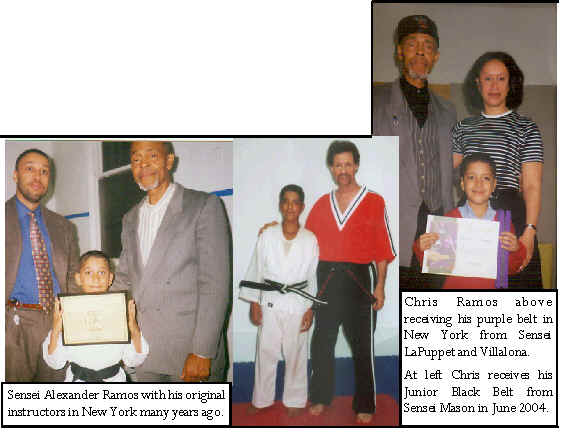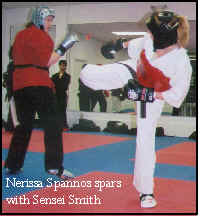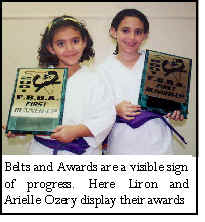
July News
The High Road to Black Belt for Children and Adults
Two students were promoted to Black Belt in June, Nerissa Spannos and Christopher Ramos. Christopher began training in New York when he was three years old under legendary Martial Arts instructor Thomas LaPuppet. When his family moved to Florida Christopher and his three older brothers began training in Mudokai at the University Karate Center. All are now Black Belts and Chris’s younger brother Brian has just begun training. Chris’s older brother Alexander received his promotion from Junior Black Belt to the Adult Black belt rank on the same day that Chris was awarded his Junior Black Belt.

Chris is also a keen Weapons student and performed an excellent two person Bo Kata at our recent Grand Opening with his partner Dustin Collins. Chris also competed at this years Florida Gold Coast Classic Martial Arts Championships in Coral Springs, Placing First in Fighting, Second in Weapons and third in Kata.
Nerissa Spannos has been training with Sensei Mason since “the beginning of the millennium”. She had trained extensively in Judo as a child and has developed her skills at the University Karate Center not only in Karate, but also in Kobudo (Weapons), Jiu Jitsu and Kickboxing (Funkicks). As a busy and successful Real Estate Agent Ms. Spannos has used her Martial Arts training at the Dojo to work off the stresses of the day, while staying in shape and practicing self-defense.
Congratulations to our new Black Belts who will now be addressed by all as Mr., Ms. or Sensei in accordance with tradition. Sensei Robert H. Mason© 2004

How Parents Can Track Children's Progress
Our MuDoKai Karate program for children requires a commitment from the child and the parent. Both must decide to work for excellence through the medium of training in the martial arts. Just as other worthwhile endeavors, such as music lessons, sports and regular school require persistence and patience, these same attitudes are necessary for success as a karate student. Sometimes it seems as though karate is considered in a different light than other activities. It is suggested that all students and parents keep their copy of the Student Code and the Parent Code in a place where this information can be referred to often. On the practical side there are many ways for inquiring parents to find out how their child is doing. A Progress Report is attached to the back of the student's attendance card stripe at each belt level. This card is a detailed record of the techniques that each student has learned and includes a rating of “A”, “B” or “C” as to their proficiency. For Beginners a “C” grade (average) is fine, Intermediate students, Blue, Green and Purple Belt, need to work toward the "B" level in each category, and Advanced students, Brown Belts , should be aspiring toward "A" level.
The Curriculum Book outlines all of the material that we teach from White Belt through Nidan (Second Degree Black Belt). It is a good reference source for students wishing to review the course outline (including all of the material required to pass each belt level), Japanese terms used in class, rules of the Dojo (training hall), a history of the our style, and an article on the philosophy taught at the Dojo. Information Sheets are available which explain in more detail red stripes and testing, Sparring (strategy) which is permitted at Gold Belt (8th kyu), the Junior Black Belt Club (JBBC) which is permitted at Blue Belt (6th kyu), Sempei (assisting in class) which is permitted at Purple Belt (4th kyu), also Kobudo (Weapons training) is permitted by request for JBBC members. Memo to the Sensei sheets are available at the Front Desk so that parents may make inquiries about anything that they need answers to. comments, suggestions, creative ideas, constructive criticism are all welcome. We are all kept very busy running the karate school and as Chief Instructor I cannot always speak with parents immediately as I often have other work to do both inside and outside the Dojo. However, we do value your input and, therefore, encourage you to use these forms so that all the Sensei can contact you to answer questions you may have. The Front Desk can also set up an appointment for you to speak with myself at a convenient time.

Signing up as a karate student yourself is always encouraged as a way to learn more about how your child is doing. Parents may attend their child's class, at the appropriate belt level, or they and their child may attend one of several Junior/Adult classes together which are listed on the schedule. You may prefer to train separately in an Adult Only class which is fine too. A Pep Talk, in the form of a mini-review, is often given at the end of each class to each student by the Instructor as they file out of the door; in this way that the child can feel connected personally to the school, to the martial arts and to the Instructor who just taught the class.
To summarize, as a professional Martial Arts studio we adhere to certain standards, codes and technical details that an expert will be more familiar with than a novice or spectator. Hence, it is unrealistic to expect that a parent will necessarily know anything about Karate practice or be qualified to judge the progress or performance of their own child in this endeavor. Just as we trust the competence of our child's orthodontist when we take them for their regular visits to have their braces worked on, letting the doctor get on with his work uninterrupted, so we need to trust the competence of the Karate Instructor when the child is brought for their class. We must let the process of the Karate School work, to develop Black Belt Excellence in the children we train. Thank you for your cooperation and support.
Sensei Robert H. Mason c2004